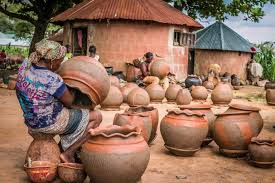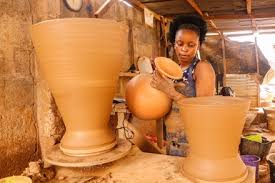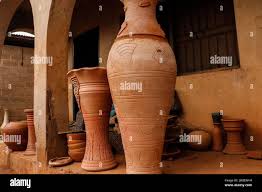![]()
If you’ve landed on this article page, you’re probably searching for a
good business idea—an idea that’s light on the pocket but heavy on
returns, promising both a fulfilling journey and potential profit.
|
How to start a Pottery Business in Nigeria
The pottery business of trading with products of pottery was
effectively managed by the women in spite of the burden of
carrying the fragile wares from one location to another after
production.
In Nigeria, Pottery business is all about production and
marketing of pottery products on a small scale for profit
purpose.
Pottery as art still has a veritable market in Nigeria, the
market structure and demand for pottery products is generally
wide as they may be
sold in places like curio shops, art kiosks, trade fairs,
exhibition, and other places. The market demand for pottery
products is wide since they are multipurpose and the products
can be sold for many different users.
Pottery products are used for various purposes such as:
decorations, flower vases in workplaces, schools, lodges and
households; while some products can be exported.
Quick Guide to Pottery Business:
Clearly identify your niche, whether it’s traditional pottery,
contemporary art pieces, or functional ceramics.
Develop your unique selling proposition to set the framework for
a distinctive brand in the market.
Carry out competitive analysis and market research to identify
trends and preferences and to make sure your pottery wares align
with consumer preference.
Production Technique Used in Pottery
The production technique used in pottery is relatively simple as
it mainly involves modelling red clay by hand, shaping tools and
paint for decorating.
Pottery production technique involves mixing clay with water;
and shaping the mixture into various pottery products such as
pot, local plate, jug, vase, piggy bank.
The modelled objects are then exposed to heat to dry then put in
a kiln for burning to get the final product. Basically, making
pottery products involves modelling, moulding, decorating and
heating.
After mixing the clay thoroughly, the potter collects the
quantity of clay they need and moulds it.
There is no scale for letting measurement, whatever the potter
those days, they carried out their operations based on their
discretion.
After moulding, each pottery scoops the pottery wares inside and
then shine the edge of the pot with stones. At times, the local
potters attach different designs to the fabricated pots using
local apparatuses.
After that, they dry their new pottery products under the sun.
When they’ve gathered about 30 to 40 pots, they take it to the
open field for firing.
The time duration for firing is for two hours or more with
firewood and dry grass. The firing is a process to solidify your
pottery products; firing prevents the clay from melting when
water is poured inside it.
In pottery, the colouring is done with “makuba” immediately
after firing. “Makuba” is the husk of locust beans.
The potter soaks the husk of locust beans in water for a while
and then dip the hot pot inside the mixture to colour the pot.
Once the pot is coloured, the pot is left to dry and then
readily available for use. Follow the same process if you want
to make local pots, plates and jugs.
Modern Production Technique
Let’s have a brief talk about the modern production technique.
The modern method is a bit technical and involves standard
measurements. Under this pottery production technique, make sure
you soak the clay and kaolin in water to ferment for three days,
after that, sieve your mixture through a mesh
There are different stages of moulding, such as circling,
centring, opening, pulling and shaping.
During the shaping, make efforts to come up with your target
audience’s preference and what they will cherish and willing to
buy your products.
The firing has the same function as in the local method of
production but uses a different approach: the bricks firing and
the glaze firing.
The glaze firing is very expensive and capital intensive;
nevertheless, the modern method is stronger and more durable
than the local method.
This is the same method of producing ceramics. If only you had
enough funding to procure glaze firing, you will be making more
money from ceramics.
You can use this method to make flower vases, piggy banks,
planters, different shapes of ornaments or ceramic plates and
mugs.
Materials Needed to Start a Small Pottery Business
Materials needed to start a small pottery business in Nigeria
include the following; Basins, Hoes , Kiln ,Medium working table
, Jerry cans , Clay, Grass, Water, Sand particles, Firewood or
modern source of heating, Oil paint
Overhead costs for labour and transportation
The most important ingredient to create remarkable pottery
products hinges on quality clay.
It’s advisable you choose reliable local suppliers to get a
steady supply of this essential raw material.
It’s equally essential to equip your workspace with the
essential tools of the trade. Get a quality pottery wheel, kiln,
and a variety of hand tools.
A well-furnished studio will enhance your efficiency and the
overall quality of your pottery products. Don’t forget to
prioritize safety by incorporating protective gear such as
gloves and aprons.
To attract and retain a steady flow of clients, your product
line should include a wide variety of items. While you will want
to include some items that are guaranteed to sell, it’s also
important to maintain your artistic integrity by creating items
you enjoy producing. To appeal to a larger market, offer sets of
items in varying sizes. You can also offer discounts on sets of
items that are purchased together. A balanced line of products
and prices and steady use of high quality materials will set a
level of consistency that ensures repeat customers.
How does a pottery business make money?
Pottery business owners earn their living off each piece they
sell. Many choose to sell primarily to individual customers,
while others have found success selling wholesale. Whichever
route you take, pay close attention to your pricing model.
Prices should include cost of materials, as well as an hourly
wage to ensure maximized profit.
How Profitable is Pottery Business in Nigeria?
In Nigeria, an individual who practise the pottery business
could make 20 to 30 pieces of clay jugs or plates in a day. They
sell smaller ones for N200 and bigger ones for as much as N300
and above.
Such an individual achieve revenue of ₦4,000 to ₦9,000 once they
sell their outputs. People order thousands of locally made pots
for sale and even for export.
Running a successful pottery business is more than a full-time
job. Your days will be spent in the studio forming, glazing and
firing your creations and making molds. You’ll also spend a
great deal of time putting your creative ideas down on paper and
preparing for future projects.
These local pots are historical and portray our cultural
identity.
Even till date, people still cook and store water in the pot
just like in the olden days. There is a popular myth that eating
from the locally made plate is medicinal.
These pots produce natural coolness to the water inside it and
because of the medicinal properties;
some people believe that drinking water from the pot can relieve
pains and ailments such as chest pain and some other ailments.
Pottery is one of the crafts of ancient Nigeria that is still
being practised in most parts of the country today. It is
Nigeria’s most cultural material that has caught the attention
and interest of early British archaeologists.
The pottery business requires creativity and patience because
it’s difficult to produce and sell the same day, whereas
nowadays youths want quick money, that’s why it is hard to see
any of them around in pottery business.
But whoever can exercise patience and learn this skill, he/she
will earn a lot of money from pottery business in Nigeria. Also,
it can be a means to generate foreign exchange earnings and
improve the country’s Internally Generated Revenue (IGR)
|







